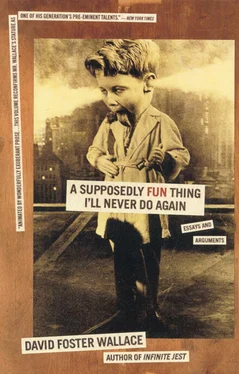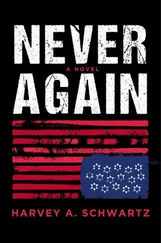Miller’s 1986 “Deride and Conquer,” far and away the best essay ever published about network advertising, details vividly an example of how TV’s contemporary kind of appeal to the lone viewer works. It concerns a 1985-86 ad that won Clio Awards and still occasionally runs. It’s that Pepsi commercial where a special Pepsi sound-van pulls up to a packed sweltering beach and the impish young guy in the van activates a lavish PA system and opens up a Pepsi and pours it into a cup up next to the microphone. And the dense glittered sound of much carbonation goes out over the beach’s heat-wrinkled air, and heads turn vanward as if pulled with strings as his gulp and refreshed-sounding spirants and gasps are broadcast. And the final shot reveals that the sound-van is also a concession truck, and the whole beach’s pretty population has now collapsed to a clamoring mass around the truck, everybody hopping up and down and pleading to be served first, as the cameras view retreats to an overhead crowd-shot and the slogan is flatly intoned: “Pepsi: the Choice of a New Generation.” Truly a stunning commercial. But need one point out — as Miller’s essay does in some detail — that the final slogan is here tongue-in-cheek? There’s about as much “choice” at work in this commercial as there was in Pavlov’s bell-kennel. The use of the word “choice” here is a dark joke. In fact the whole 30-second spot is tongue-in-cheek, ironic, self-mocking. As Miller argues, it’s not really choice that the commercial is selling Joe Briefcase on, “but the total negation of choices. Indeed, the product itself is finally incidental to the pitch. The ad does not so much extol Pepsi per se as recommend it by implying that a lot of people have been fooled into buying it. In other words, the point of this successful bit of advertising is that Pepsi has been advertised successfully.” 25
There are important things to realize here. First, this Pepsi ad is deeply informed by a fear of remote gizmos, zapping, and viewer disdain. An ad about ads, it uses self-reference to seem too hip to hate. It protects itself from the scorn today’s TV-cognoscente feels for both the fast-talking hard-sell ads Dan Aykroyd parodied into oblivion on Saturday Night Live and the quixotic associative ads that linked soda-drinking with romance, prettiness, and Group-inclusion, ads that today’s hip viewer finds old-fashioned and “manipulative.” In contrast to a blatant Buy This Thing, the Pepsi commercial pitches parody. The ad is utterly up-front about what TV ads are popularly despised for doing, viz. using primal, flim-flam appeals to sell sugary crud to people whose identity is nothing but mass consumption. This ad manages simultaneously to make fun of itself, Pepsi, advertising, advertisers, and the great U.S. watching consuming crowd. In fact the ad is unctuous in its flattery of only one person: the lone viewer, Joe B., who even with an average brain can’t help but discern the ironic contradiction between the “Choice” slogan (sound) and the Pavlovian orgy around the van (sight). The commercial invites Joe to “see through” the manipulation the beach’s horde is rabidly buying. The commercial invites a complicity between its own witty irony and veteran viewer Joe’s cynical, nobody’s- fool appreciation of that irony. It invites Joe into an in-joke the Audience is the butt of. It congratulates Joe Briefcase, in other words, on transcending the very crowd that defines him. And entire crowds of Joe B.’s responded: the ad boosted Pepsi’s market share through three sales quarters.
Pepsi’s campaign is not unique. Isuzu Inc. hit pay dirt in the late ’80s with its series of “Joe Isuzu” spots, featuring an oily, Satanic-looking salesman who told whoppers about Isuzu’s genuine llama-skin upholstery and ability to run on tapwater. Though the ads never said much of anything about why Isuzus are in fact good cars, sales and awards accrued. The ads succeeded as parodies of how oily and Satanic car commercials are. They invited viewers to congratulate Isuzu’s ads for being ironic, to congratulate themselves for getting the joke, and to congratulate Isuzu Inc. for being “fearless” and “irreverent” enough to acknowledge that car ads are ridiculous and that Audience is dumb to believe them. The ads invite the lone viewer to drive an Isuzu as some sort of anti-advertising statement. The ads successfully associate Isuzu-purchase with fearlessness and irreverence and the capacity to see through deception. You can now find successful television ads that mock TV-ad conventions almost anywhere you look, from Settlemeyer’s Federal Express and Wendy’s spots with their wizened, sped-up burlesques of commercial characters, to those hip Doritos splices of commercial spokesmen and campy old clips of Beaver and Mr. Ed .
Plus you can see this tactic of heaping scorn on pretentions to those old commercial virtues of authority and sincerity — thus (1) shielding the heaper of scorn from scorn and (2) congratulating the patron of scorn for rising above the mass of people who still fall for outmoded pretensions — employed to serious advantage on many of the television programs the commercials support. Show after show, for years now, has been either a self-acknowledged blank, visual, postmodern allusion- and attitude-fest, or, even more common, an uneven battle of wits between some ineffectual spokesman for hollow authority and his precocious children, mordant spouse, or sardonic colleagues. Compare television’s treatment of earnest authority figures on pre-ironic shows— The FBI ’s Erskine, Star Trek ’s Kirk, Beavers Ward, The Partridge Family ’s Shirley, Hawaii Five-0 ’s McGarrett — to TV’s depiction of Al Bundy on Married … with Children , Mr. Owens on Mr. Belvedere , Homer on The Simpsons , Daniels and Hunter on Hill Street Blues , Jason Seaver on Growing Pains , Dr. Craig on St Elsewhere .
The modern sitcom, 26in particular, is almost wholly dependent for laughs and tone on the M*A*S*H -inspired savaging of some buffoonish spokesman for hypocritical, pre-hip values at the hands of bitingly witty insurgents. As Hawkeye savaged Frank and later Charles, so Herb is savaged by Jennifer and Carlson by J. Fever on WKRP , Mr. Keaton by Alex on Family Ties , boss by typing pool on Nine to Five , Seaver by whole family on Pains , Bundy by entire planet on Married… w/ (the ultimate sitcom-parody of sitcoms). In fact, just about the only authority figures who retain any credibility on post-’80 shows (besides those like Hill Street ’s Furillo and Elsewhere ’s Westphal, who are beset by such relentless squalor and stress that simply hanging in there week after week renders them heroic) are those upholders of values who can communicate some irony about themselves, make fun of themselves before any merciless Group around them can move in for the kill — see Huxtable on Cosby , Belvedere on Belvedere, Twin Peaks ’s Special Agent Cooper, Fox TV’s Gary Shandling (the theme to whose show goes “This is the theme to Ga-ry’s show”), and the ironic ’80s’ true Angel of Death, Mr. D. Letterman.
Its promulgation of cynicism about authority works to the general advantage of television on a number of levels. First, to the extent that TV can ridicule old-fashioned conventions right off the map, it can create an authority vacuum. And then guess what fills it. The real authority on a world we now view as constructed and not depicted becomes the medium that constructs our world-view. Second, to the extent that TV can refer exclusively to itself and debunk conventional standards as hollow, it is invulnerable to critics’ charges that what’s on is shallow or crass or bad, since any such judgments appeal to conventional, extra-televisual standards about depth, taste, quality. Too, the ironic tone of TV’s self-reference means that no one can accuse TV of trying to put anything over on anybody. As essayist Lewis Hyde points out, self-mocking irony is always “Sincerity, with a motive.” 27
Читать дальше












